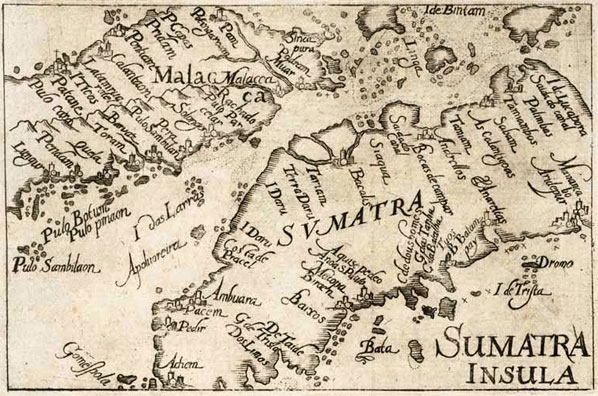|
MUSINGS
Lived dangerously and yet survived - Varthema
by Padma Edirisinghe
Living dangerously especially in the matrix of international
relations devolved more on the male sex. And that too, those living in
modern times tried it more. Fewer were the men who attempted it in
bygone days. "IT" here is an understatement for underworld negotiations,
masquerades, tons of lies etc.
Perhaps Varthema of Bologna was the first of the lot. The writer
picks on him for another reason i.e. he was in Ceylon either before or
after Lourenço de Almeida's visit here and included an account in his
memoirs published in Rome in 1510 according to author Hulugalle.
He had indeed spent an adventurous and unscrupulous life in those
days of burgeoning sea travel when Portugal was oozing with those
afflicted with sea fever and travel to unknown places.
Coffers
Varthema could have disappeared in the coffers of history if he was
just one of them,
but he kept his eyes and ears more alert and even went on to Media
work and writing while masquerading too.
|

Map from Varthema’s Travels. Pic. alteagallery.com |
Media? Yes. The present writer sieved rightly or wrongly that it was
Varthema who had been instrumental in carrying a letter to king Manuel
of Portugal informing the incident of Lourenço De Almeida accidentally
appearing on our island's shores.
The letter had caused much jubilation in Lisbon, while even the
contemporary Pope had been informed about it.
But of more topical interest is his "Disguise" aspect that no other
global traveller of the times seems to have dared. He dared to adopt the
race of the country he set his feet on.
"At Damascus he had been a Muslim or pretended to be one and visited
Mecca and Medina taking the name of Yunas or Jonah.
Convert
"But he had been discovered at Mecca by a Moor who himself had been
in Venice and Genoa. But he deceived him by lying that he was a convert
to Islam now. He later used this person to join the Syrian caravan
plodding its way to the West coast of India with sea travel being
mastered intermittently. Perhaps it was travel down this coast that
landed the adventurer in Ceylon.
This journey had its fair share of adventures for at Aden he was
arrested and imprisoned for spying. The Sultaness helped him out. Nor
did he return home straight from Ceylon
But went over to Calicut where he again acted as a Moor refuging in
the capital of the Zamorin.
Informant
His greatest feat however can be reckoned as being the informant of
THE DISCOVERY of CEYLON to Europe. King Manuel of Portugal was so
thrilled that he conveyed the news to Pope Julius 11 who celebrated the
event by a great procession organized on St.Thomas Day that fell on
December 21, 1507, some 509 years ago.
What about the memoirs of Varthema? As it was the very early years of
Portuguese rule he could not opine on this aspect too long. However
cinnamon he touches on and Cameons, the Portuguese poet reiterates the
memory by this line,
Canella com que Ceiloa hi rica, illustre e bella.
Cavern
Varthema's information sources for his memoirs could have been the
Moor traders active mostly in Colombo harbour. He seems to encounter
them wherever he went about.
Not knowing about the island much themselves they regaled stray
visitors like Varthema with many a doubtable fact that however finally
filled what came to be called Memoirs.
Here is an illustrative account of Adam's Peak.
"A Moorish trader once told me, that at the top of that very large
mountain, there is a very large cavern to which men of that country go
once a year, because Adam was up there praying and doing penance.
Impressions of his feet are seen even today". Here is another
howler."Rice does not grow in this country but comes from the mainland.
The kings of this country are tributaries of the kings of Narsinghe on
account of this imported rice from the mainland."
From which source Varthema got the name Narsinghe that somewhat
approximates to Narendrasinghe bewilders one for the king by this name
appears in the highlands years nay centuries later. The dilemma is a
pointer to take these source material with not one pinch of salt but
several.
Varthema himself, had later acted as Portuguese factor in Cochin and
returned to Europe in 1507 or 1508. In the intervening period he had met
many a liar and conman while he himself was not loth to impersonate
those of other religions and races.
"He lived dangerously and yet survived." |

